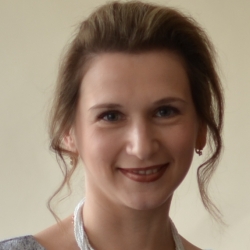

СДЕЛАЙТЕ СВОИ УРОКИ ЕЩЁ ЭФФЕКТИВНЕЕ, А ЖИЗНЬ СВОБОДНЕЕ
Благодаря готовым учебным материалам для работы в классе и дистанционно
Скидки до 50 % на комплекты
только до
Готовые ключевые этапы урока всегда будут у вас под рукой
Организационный момент
Проверка знаний
Объяснение материала
Закрепление изученного
Итоги урока

Analysis of Joseph Brodsky’s poetry style and composing a new poem
A lot of people write their own poems in their youth when they want to express their emotions, or find the resolution to their problems, by analyzing the situation through poems. Furthermore, the representatives of the young generation read poems of different poets and choose their favorite authors and the style of writing they like. I really like poetry and spend much time reading or learning poems. One of my favorite poets is Joseph Brodsky and that is why I decided to work on a project last year to translate and analyze his poem. I was really engaged in this work and decided to continue my personal project on poetry. This time I decided to analyze Brodsky’s own style of poetry writing, discover some particular features, and compose my own poem imitating Brodsky’s style. This theme is relevant to me, because last year I started to write poems in English, but I don’t have some special style, that is why by detecting the style of my favorite poet I might be able to shape my own. Also, it is interesting for me to explore literature in different languages, especially if the author is Russian and he writes in English, since I want to develop my compositional skills in a foreign language. I think this theme is relevant to others also, since budding poets can find some advice on how to create their own poem.
Просмотр содержимого документа
«Analysis of Joseph Brodsky’s poetry style and composing a new poem»
Municipal Autonomous Educational Institution
“Mathematical Lyceum”
Theme: Analysis of Joseph Brodsky’s poetry style and composing a new poem
English language section
Research work
Done by: Tereshchenko Dariana Aleksandrovna,
Form: 10 “A”
Supervisor: Boiarinova Aleksandra Aleksandrovna,
English language teacher
Khabarovsk
2017
Contents
Introduction 3
Chapter 1.
Biographical facts of the poet’s life 5
The analysis of the poems’ style of writing 6
The process of composing the poem 14
Chapter 2. Investigation 18
Conclusion 21
List of literature and sources 22
Appendix 23
Introduction
A lot of people write their own poems in their youth when they want to express their emotions, or find the resolution to their problems, by analyzing the situation through poems. Furthermore, the representatives of the young generation read poems of different poets and choose their favorite authors and the style of writing they like. I really like poetry and spend much time reading or learning poems. One of my favorite poets is Joseph Brodsky and that is why I decided to work on a project last year to translate and analyze his poem. I was really engaged in this work and decided to continue my personal project on poetry. This time I decided to analyze Brodsky’s own style of poetry writing, discover some particular features, and compose my own poem imitating Brodsky’s style. This theme is relevant to me, because last year I started to write poems in English, but I don’t have some special style, that is why by detecting the style of my favorite poet I might be able to shape my own. Also, it is interesting for me to explore literature in different languages, especially if the author is Russian and he writes in English, since I want to develop my compositional skills in a foreign language. I think this theme is relevant to others also, since budding poets can find some advice on how to create their own poem.
Because most poets usually mix the styles of writing depending on the feelings they want to show in every single poem, it is sometimes hard to identify the exact poetry writing style. Fortunately, it is always possible to find poems with similar feeling and emotions in every author’s list of compositions. All languages have numerous plans or methods of arrangement of the words, called poetic devices, which can assist the writer in developing cogent expressions to please the reader. So, the poets use these poetic devices to form their own style. And the problem of the investigation: through discovering the other person’s writing style it is possible to find the most common literature device, that are used in the poems.
The first English poem by Brodsky I read was “Don’t leave the room”, while doing my personal project last year. There are plenty of poems, verses, essays and translations written by this author. It is very interesting that some of them were originally written in a foreign language, so Brodsky is usually known as a Russian and American poet and essayist. That is why it would be great for me to practice my writing skills, while having the challenging condition «to imitate Brodsky's style». After reading different poems and essays in both the English and Russian languages, I made the conclusion that the writing styles of the Russian and English versions are very alike, as he wrote all poems in his own special way. The hypothesis of the investigation: it is possible to discover Brodsky’s poetry writing style by analyzing some of his English verses while finding the poetic devices he used most of all. Moreover, I would be able imitate this style while composing my own verse.
The object of my research is Brodsky’s specific writing style.
The subject is poetry.
The aim of this scientific work is to analyze Joseph Brodsky’s poetry style and to compose my own poem imitating the discovered style.
The tasks of the investigation:
to analyze how the poet’s life affected his writing style;
to analyze the style of writing through several poems;
to discover Brodsky’s own style of poetry writing;
to compose my own poem;
to compare the author’s style with the style of the composed poem;
to study the results of the survey.
The methods of the investigation:
• observation
• descovery
• analysis
• comparison
Biographical facts of the poet’s life
To begin with, I decided to research the information on Brodsky life to form an understanding of how his life affected his style of writing, since a persons biography shows his ideology and world outlook.
Brodsky was born in 1940 into a Jewish family in Leningrad. His father, Aleksandr Brodsky, was a professional photographer and his mother, Maria Volpert Brodsky - a professional interpreter. They lived in communal apartments, in poverty, marginalized by their Jewish status. In early childhood Brodsky survived the Siege of Leningrad where his family nearly died of starvation. Because of the anti-Semitic behavior of his teachers, Brodsky felt like a dissident from an early age. [5]
At fifteen, Brodsky left school and he tried to enter the School of Submariners. After successfully passing all the exams, he didn’t apply there due to his nationality. He subsequently held a variety of jobs in hospitals, machine companies, morgue, a ship's boiler room, and on geological expeditions. At the same time, Brodsky engaged in a program of self-education. Young Brodsky also learned Polish and English. During this period, he acquired a deep interest in classical philosophy, religion, mythology, and English and American poetry.
In 1957 on a geological expedition, Brodsky wrote his first poem, which instantly became very popular. He also began producing literary translations. Brodsky circulated them in secret, since writings were apolitical. By 1958 Brodsky was already well known in literary circles for his poems "The Jewish cemetery near Leningrad" and "Pilgrims". Asked when he first felt called to poetry, he recollected, "In 1959, in Yakutsk, when walking in that terrible city, I went into a bookstore. I snagged a copy of poems by Baratynsky. I had nothing to read. So I read that book and finally understood what I had to do in life. Or got very excited, at least. So in a way, Evgeny Abramovich Baratynsky is sort of responsible." [13]
In 1960, Brodsky met Anna Akhmatova, who recognized in him the most gifted lyrical voice of his generation, and would go on to become his mentor. [3]
In 1963, a Leningrad newspaper denounced Brodsky's poetry as "pornographic and anti-Soviet". They called him "a pseudo-poet in velveteen trousers". The trial judge asked "Who has recognized you as a poet? Who has enrolled you in the ranks of poets?" — "No one," 23 years old Brodsky replied, "Who enrolled me in the ranks of the human race?" During the trial he was depressed because of the break up with his beloved. (Appendix 2) [14]
Brodsky was transported to Archangelsk, where he was under huge physical pressure. (Appendix 3) After returning to Leningrad in December 1965, Brodsky continued to write over the next seven years. He was a splendid poetic translator and translated the English metaphysical poets, and Polish poets, into Russian. His own poetry has been translated into at least ten languages. [12]
On June 4, 1972, Joseph Brodsky became an involuntary exile from his native country. After brief stays in Vienna and London, he came to the USA. His first book of poetry translated into English appeared in 1973. He has been Poet-in-Residence and Visiting Professor at the most famous British and American universities. Moreover, Brodsky was awarded an honorary degree of Doctor of Letters and inducted as a member of the American Academy and Institute of Arts and Letters. Also, Brodsky was award for his works of "genius". (Appendix 1)
A collection of Mr. Brodsky's essays on the arts and politics “Less Than One” won the National Book Critic's Award for Criticism. Celebrated as the greatest Russian poet of his generation, Brodsky authored nine volumes of poetry, as well as several collections of essays. He became the youngest Nobel laureate, after receiving this price in 1987. [7] (Appendix 2)
In youth, Joseph was very unhappy in love. And only before death he found his real happiness in the family. He died of a heart attack in his Brooklyn apartment in 1996.
The analysis of the poem’s style of writing
In this project work I decided to focus on the structure of the poem and its versification. Therefore, I would not analyze the time period, when the chosen poems were written, and which events in Brodsky’s life motivated him to compose them. That is why I would take poems with different meanings.
After reading several of Brodsky’s poems in English that were firstly written in English or translated by the poet himself, I found that there are some similarities in each, as well as obvious differences. I decided to choose some poems that have the same poetic devises and similar versification. I chose the poems: “Star of the Nativity”, “To Urania”, “Belfast tune”, “Stone villages”, and “A list of some observation” (Appendix 4, 5, 6, 7, 8), for the deep analyses, and locate chosen similarities in other poems, which demonstrates the style of Brodsky’s writing.
Firstly, I want to do an analysis of the poet’s life and find some features of how his life might have affected his way of writing. Since he had tried many professions, he knew special words which are used in those professions. Also, he had lived in various life conditions, while staying in different countries, so he learnt the characteristics and particularities of several spheres of life. That is why Joseph Brodsky uses different poetic devices which are needed to express the meaning of words, for example, metaphor, euphemism, analogy, allusion, allegory, and others (Appendix 3). Furthermore, he expressed freely his opinion about the political situation and government, therefore he used literary devices such as connotation, hyperbole, irony, oxymorons, synecdoche, etc. (Appendix 3) Moreover, his sharp versification with a lot of enjambment (Appendix 3) was formed under considerable psychological pressure after problems Brodsky had in his life, for instance, the Siege of Leningrad, exile to Arkhangelsk, unrequited love, and his deportation from the USSR. Sometimes, there is not a certain form of stanzas in hall verse; I think the appearance of this fact also arose after uncertainty in his life. It is also possible to mention that these factors {problems and uncertainty in his life} were the reasons why some of Brodsky’s poems are monotonic, as well as his own intonation during readings by author. [11]
Secondly, I started to analyze every chosen poem. The first poem is “To Urania”, that is included in the collected poems “To Urania”, written in 1981 (Appendix 4). This poem is not divided into stanzas and there are 20 lines in it. There is no efficient style of rhyme, however, in some lines it is possible to find the rhyme close to the alternative one with the scheme abab. As well as the “Star of the Nativity” this poem is written from the 3rd Person limited, and has the open form (Appendix 3). As in most of Brodsky’s poemS there are a lot of enjambments; there is stress in the middle of each line. [6]
Before analyzing whole structure of the poem, I will pay attention to the title. In Greek mythology, Urania is the muse of astronomy. [11] Also, there is a mention of the muse of history – Clio. [11] Since Brodsky talks about muses in this poem, he uses allusion. (Appendix 3) I think Brodsky uses a kind of metonymy expressing Urania as the universe. This poem is written in the melancholic mood, however, the author uses different poetic devices to display a special solemn style.
This poem can be divided into two meaningful parts. In the first part, which finishes at the phrase “you see she hides nothing, unlike the latter”, Brodsky thinks about “limit, sorrow, loneliness, space, emptiness”, showing the poem’s mood. It is possible to understand that the author reflected on his present and past life. He also uses some comparison {stare – leaf}, allegory {space - body's absence}, rhetorical question {And what is space anyway if not the body's absence at every given point?}, personification {perspective cuts emptiness}, ambiguity {“Loneliness cubes a man at random”} to give reasons for the exclamation “That's why Urania's older than sister Clio!” (Appendix 3) In the second part, the author tries to find the answer to his own questions, searching in different places “blueberry-laden forests”, “rivers”, “the towns”, “brown mountain ranges”, “farther eastward”, etc. Brodsky illustrates different locations to show the passing of time while a person searches for the resolutions, and does not notice how they age “the cheekbones get yellower”, thinking the solution will be found after “expanse grows blue like lace underwear”.
Thus, reader of “To Urania” starts to think about the infinity and its “limit” and how two sisters, Urania and Clio, are connected. So, as I think Brodsky uses personifications: universe - Urania and the person’s life – Clio. The author explicates the main idea through two parts of the poems while drawing different pictures in the reader’s imagination. To my mind, the poet wants a person to think about the continuation of the poem by himself, using all the thoughts and emotions he got while reading it.
The second poem “Belfast Tune” was composed in 1986 and published in the collected poems “To Urania” (Appendix 5) This poem consists of 4 quatrains and written from the 3rd Person omniscient. However, there is a part, where the teller talks from the 1st person. An open formed poem has an alternating rhyme scheme abab. There are also many enjambments in the poem. [6]
The action takes place in Belfast; the 3rd Person describes a girl in this town. Details about her appearance and doings are given, such as: “her dark hair short”, “folds her memories like a parachute”, “collects the peat and cooks her veggies”, “her knee-length quilt skirt's”. Furthermor, the town’s characteristics are described as “dangerous” and “small”, so there is simile {“her memories like a parachute”, “her stare stains your retina like a gray bulb”}, metaphor {“shoot here where they eat”}, hyperbole {“more sky in these parts than, say, ground”}, personification {“her stare stains your retina”}, analogy {“knee-length quilt skirt's cut to catch the squall”} and metonymy {“her stare stains your retina like a gray bulb when you switch hemispheres”}. (Appendix 3) During the entire poem we can see the specific description of the girl and how she interacts with the town. The mood of the poem is dark owing to the deeply detailed specification of abstract and objective items.
After reading the poem, it can be only guessed what happened with this girl later, if she was killed or loved. This poem can cause the reader to reflect on death and love “I dream of her either loved or killed, because the town's too small.” I think, this poem presents the idea that many things are ugly and scared at first sight, however, if we love and take care of it, life can improve.
The next poem is called "A list of some observation", which was written in 1975-1976 (Appendix 6) and included in the cycle of Brodsky's poems "A part of speech". This poem is structured on one stanza formed from 12 lines. Two types of rhyme scheme can be mentioned: abab and aabb. Each line is stressed on the last syllable. The poem is told from 3rd person limited. (Appendix 3) [2]
In my opinion, the poem's speaker is the author himself. During the poem Brodsky makes a list of observations he had made in general life {"In a corner, it's warm"}, {"glance leaves an imprint"}, {"Water is glass's"}. The author reflects on the connection between the person and the outer world. Brodsky uses touch {"resists an osier's stiff assaults"}, eyesight {"glance leaves an imprint"}, hearing {"mumbling "Good night""} and smell {"wine"} to represent the meaning of different situations through the imagination and spirit. Furthermore, there are different poetic devices used, for instance, simile {"the body bulks like a glacier's debris"}, synecdoche {"elbow"}, personification {"fossil mumbling"}, symbol {"glance leaves an imprint on", "fossil", "elbow"}, analogy {elbow-marine}, ambiguity {"Man is more frightening than its skeleton"}, connotation {"millennium hence"} and metaphor {"A glance leaves an imprint on anything it's dwelt on", "Water is glass's most public form"}. (Appendix 3) To my mind, the main idea of this poem is to reveal information about hidden secrets. Brodsky conveys this theme step by step. At first, he states general things as "In a corner, it's warm", "Water is glass" to show that everything in a person's spirit starts in the same condition. The metaphor in the fourth line expresses that the moral part of a human is much worse than their biological basis. Earlier, there is ambiguity in the 2nd line of the poem, which shows that every secret "glance" leaves an "imprint" on the person, his life and society. To develop this idea, Brodsky uses various literary devices from the 5th to the 8th lines to intensify the fact of the increasing pressure on a person, hiding his secrets in himself and maybe worsening the situation in society, by lying in order to keep his secret. In the last lines, Brodsky presents the reader with the idea of a "millennium hence", which reveals a secret a person was hiding from the public eye. The poet shows that even if you desperately try to hide the truth, the falsehood will ultimately be discovered after "fossil bivalve mumbling "Good night" to a window hinge".
By using many poetic devices and remorseful tone in "A list of some observation" Brodsky muses on the permanent problem of secrecy and after-effect it brings. He evaluates the main idea throughout the poem, while deciding it into different parts to clearly show the elaboration of reflections. The poet uses many comparisons to illustrate the problem from different sides. To my mind, author successfully gets to coda and brings reader an understanding of the subject.
The fourth poem's title is "Stone villages". (Appendix 7) This poem was written in 1975-1976; it is the last composition in the series of poems "In England". Composed from 3 four-lined stanzas, it does not have a special rhyme scheme, since there is no rhyme style followed in the entire poem. There is something like assonance (suit-see, East-blows) and visual rhyme (tiles-files). (Appendix 3) As in previous poems, there is no metrical or line form; and it is written from the 3rd person omniscient. There are also few enjambments in this poem. [4]
The poem starts with a description of the surroundings, while using monosyllabic sentences to reinforce the perception of the place where action takes place. The author shows us a calm mood, there is a metaphor {"A cathedral bottled in a pub window"}, which also contains the meaning of contrast {cathedral - pub}, so there are two absolutely different places, which do not disturb the entire equilibrium. (Appendix 3) I think Brodsky wanted the reader to pay attention to the beauty of an English village. In the second stanza, there is a story line of father and daughter, who is leaving to the sea. In my opinion, the poet describes this situation to show that on the one hand, the daughter is going to the East, to rest, escape from routine, and father is smiling. But on the other hand, father will be left alone in this village wearing a moth-eaten suit. In this stanza, we can mention metonymy {"moth-eaten suit"} and a phrase which expresses sound {“A whistle blows”}. I think the last line of the stanza switches the person's attention from the described situation to the thoughts below. In the final stanza, I feel that the bird is the daughter-liberty and song is her father-loneliness. There is connotation {"endless sky over the tiles"}, gradation {"grows", "swelling", "clearer the song is heard"} and paradox {"the clearer the song is heard, the smaller the bird"}. (Appendix 3)
It is so interesting how Brodsky develops the idea of relationship between father and daughter throughout the description of the placid village. This poem can make the reader think that in spite of an overall calmness, there are always some things people feel keenly about.
The last chosen poem is “Star of the Nativity”, which was written in December of 1987; it is one of the translated poems by the author, published in the book “So Forth” (Appendix 8). It is written from the 3rd Person omniscient. The metrical of every stanza does not have any order, which means that every line has its own metrical form without any algorithm of repetition. Composed of 3 four-lined stanzas, the poem has an open form (Appendix 3). That is why there is no consistency in line length and metrical form. There is no special algorithm of showing stress in the poem, since in some lines it can be made in the next line or meaning sintagma. The scheme of rhyme is alternative aabb. [1]
In this poem, Brodsky describes the birth of Jesus “child was born in a cave in order to save the world”. Brodsky uses a lot of imagery (Appendix 3) to show the correct picture where the situation takes place. He uses paradox and synesthesia to increase understanding of the locality. The author also tries to draw a picture in the reader’s head through metaphor {“He was but a dot”, “that was the Father’s stare”}, synecdoche {“He was but a dot, and a dot was the star”}, hyperbole {the depth of the universe}, ambiguity {“the team of Magi”}, allusion {“Caspar, Balthazar, Melchior”}, oxymoron {horizontality – mountain, cold - desert}. (Appendix 3) In this poem, Brodsky immerses the reader in the cave, describing all the surroundings, as well as all characters and weather outside the cave. He lets us understand which feelings there are in this place. By the style of language and expression of thoughts, Brodsky expresses a calm mood and tone. However, he pays attention to the smallness of child and star. The baby is so small, compared to the surroundings, {To Him, all things seemed enormous} as well as the star compared to the whole universe. The deduction was made out of this thought line: Jesus is equal to the star. {“He was but a dot, and a dot was the star”}
So, after reading the “Star of the Nativity” person can make some interesting philosophical conclusions based on the feelings and emotions which Brodsky uses to show the details of the situation in the poem. Also, person can hypothesize about the continuation of the story, since there is no a clear ending of the poem.
Finally, after all five chosen poems were analyzed I am able to make a list of the similarities, which demonstrates the style of Brodsky’s writing. Furthermore, these conclusions will be proved with the information from the other poems.
Particular characteristics of Brodsky’s style of poem writing:
Using an open form in arrangement or method to convey the poem’s content with free verse. {It is used in all poems that I have analyzed and also, for instance, in “A Polar Explorer”[6], “I sit by the window”[2], “On love”[2]}
Using enjambment. {I have never read Brodsky’s poem without any enjambments. More examples, not including five chosen poem: “Don’t leave the room”[4], “Part of Speech”[2], “Folk Tune”[6]}
Writing the poem from the 3rd Person omniscient. {“Star of the Nativity”, “Stone Villages” and “Belfast Tune”, as well as “On the 100th Anniversary of Anna Akhmatova”[4], “Constacy”[1], “Galatea Encore”[6]. Brodsky uses this style for writing the poem to attract the reader’s attention on the idea of the poem and reflections author presents. There are, also the examples of the 3rd Person limited {“To Urania”} and the 1st Person {“I Sit by the Window”[2]}, however I read less poem’s with this type of arranging the poem}
Using allusion {“To Urania” and “Star of the Nativity”, the other poems, where Brodsky uses this poetic devise are “Tsushima Screen”[6] - Epiphany, “Daedalus in Sicily”[4] – Cretan queen, Phaeton, Cretan labyrinth, Hades, “Don’t leave the Room” [4]- chronos, cosmos, eros, race, and virus},
Composing the poem around the story or situation happening to the characters of the poem, as well as based on controversies and metaphors {“Star of the Nativity”, “Stone Villages”, “Belfast Tune”, “To Urania”, moreover, “A Polar Explorer”[6] – the mood and feelings of the polar explorer, and his attitude to the things happening around him, “A song”[1] – regrets of a teller, its feelings; using metaphor to express the images “sun, moon, water”}
Making reflections through presenting different comparisons, synonyms and gradations in order to show the different sides of the poem’s problem. {In all chosen poems and for instance in “Folk Tune”[6] – “either like that rod or like logs to rejoin their old grove's sweet rot”; “like eggs in the frying pan”; “like fish that gasp at the foreign blue”; “This will be me: no insides in thrall”, “Constancy”[1] – “as Clausewitz would have put it”; “like a kremlin or, better yet, manhattan”; “To die, to abandon a family, to go away for good, to change hemispheres, to let new ovals be painted into the square”, “Daedalus in Sicily” [4] – “building something, inventing something”, “As though inventions and constructions”}
Division of the poem into the notionai parts of the poem, using an increase in the philosophical meaning and not finishing the idea at the end to make a reader think about the outcomes. {In my opinion all of Brodsky’s poems which I have read have this quality. So all the chosen have this division and, for example, “I threw my arms about those shoulders”[4], “Folk Tune”[6], and “Elegy”[6]}
1. 3. The process of composing the poem
Before starting to write the poem I want to mention that it is not the first time for me to compose my own poem in English. To be honest, I feel that composing verses in English is much easier for me than in Russian. Since Brodsky is my favorite poet and I read a lot of his compositions, my writing style slightly imitates Brodsky's. However, I have not composed the poem with all the characteristics of Brodsky's style that I have discovered. That is why I decided to make a plan to compose my own poem copying Brodsky's style.
The process of composing my own poem;
Read all my finished poems in English;
Find the poem that has more similarities with discovered Brodsky's style;
Analyze what I need to add or correct;
Redact or add the parts of the poem, which I choose in point 3;
Get a supervisor review;
Formatting and correction;
Final check with a supervisor.
After the first two points of the plan were done, I have chosen a poem I have written for my best friend, whom I left nearly one year ago. There are two different poem’s titles: "For Judy" and "Unfairness of life". (Appendix 9) I have chosen this poem because as in Brodsky's poems it has a stress on the last syllable; it is written in the 3rd Person omniscient, while using an open form; there is a developing story; there are reflections; it is divided into the notion parts.
When I have found the similarities with the Brodsky's style, it was easy to discover what I need to fix and add. Firstly, there are few enjambments in my poem; however, Brodsky always uses many of them; so I need to add some enjambments in my poem. Secondly, I have not used allusions at all and I need to get rid of this lack. Thirdly, I need to add the details of the developing situation with characters and insert comparisons, synonyms and gradations.
After completing all next steps I achieved this variant of the poem.
Hairs are fallen.
Her life was stolen,
Stolen by her own soul,
Soul that was very depressed.
The life was given by heavens
But it was suddenly changed
In a manner with the essence
Of making things disarranged.
The chaos came into her mind,
The chronos was passing as if it was blind.
The shadowy figure of Thanatos
Was trying to capture her from the narrators,
Who tried to obviate her inner strife
somehow, but all things in her present life
fell down. Without an expectation
for salvation or clarification.
People were trying to save her common sense,
But she just chose to run down.
Escape from her own town,
Escape from the excellent life, thence
She wasn’t alive therein,
as a flower in the rubbish bin,
like bird in the metal cage,
trying to escape from the siege.
The real savior was round the corner.
People don't ask for a help from
Stranger, poor man and foreigner,
However, they only worm
Through their problems, emotions,
Feelings, actions and motions,
Thinking that somebody will solve their life,
Not using the force and knife.
The person round the corner in the invisible glitch,
Was a savior, her angel, her half.
The angel with his own life, which
Was destroyed into small parts.
All of sudden it thundered. Cold weather.
Two people on the road, the angel and SHE.
Circumstances brought them together,
It wasn't a chance, it was a true destiny.
They supported each other so deeply.
Angel repaired her soul so quickly.
She was given the extra chance in her life,
Even if she didn’t notice.
But now the fate separates, entangles
them. Life loves the distance between
bounded things. She's a part of the angel.
Angel is segment of her.
She is sitting near the window,
The angel is sleeping near.
They are closed and can see each other.
For the last time they are together.
Far from and with them at the same time
There is a star in the skyline
Watching, observing, thinking, making a line:
"Life leaves everything behind the shine".
They will be far from each other. But they
will be together anyway.
The shine of loneliness is coming
Due to unfairness of lifeline.
2. Investigation
As an investigation part I decided to make a survey for people, who study English or who are native speakers. In this survey 101 people participated. There were Russian, Korean, Italian, New Zealand, American, Irish, Spanish, Mexican, Australian and Canadian people, who answered my questions.
Before listing the questions I want to give the aim of my interrogations. So, the purpose is to figure out if people write poems in foreign languages, are there any problems in composing them, and is my poem's writing style similar to Brodsky's. I made a Google Form called "The Survey for Personal Project" [9], where I introduced myself, explained the subject of my research work, and asked questions. There were several types of answer: multiple choice, paragraph answer and checkboxes. For the 3 questions my poem was attached, for the 4th question there was "list of the particular qualities" and some the poetic devises’ definitions, and for the 5th, a link to Brodsky's poems was provided.
There were 4 obligatory questions. Also, the 3rd question was only necessary following a positive answer to the 2nd question. The 6th question is an optional one. (Appendix 10 and 11)
The survey consist from this information:
Write your name, surname and city where you live.
1. Have you ever written a poem in a foreign language?
1) Yes
2. Write, which difficulties you had, if you had some. Write "No", if there were not any.
2) No
3. Have you ever read works Brodsky had wrote? If you answer "Yes", write, what type of work (poem, essay etc.).
4. Choose all the characteristics from the list that can be found in an attached poem
Using an open form in arrangement or method to convey the poem’s content with free verse.
Using enjambment.
Writing the poem from the 3rd Person omniscient.
Using allusion
Composing the poem around the story or situation happened with characters of the poem, as well as based in controversies and metaphors
Making reflections through presenting different comparisons, synonyms and gradations in order to show the different sides of the poem’s problem.
Division of the poem into the notion parts of the poem using the increasing of the philosophical meaning and not finishing the idea at the end to make a reader think about the outcomes.
5. Does the writing style of "Unfairness of life" comply the Brodsky's manner of writing?
1) Yes
2) No
6. What did the poem make you think about?
To the first question, 57 people (56.4%) answered that they had written poems in English, while the other 44 people had not. (Appendix 12)
Of the people who answered positively to the previous question, 19 of them (33%) had not had problems with composing poems in a foreign language. 28 people, (most of those interviewed), said it is difficult to choose the words which express the idea of the poem. A popular answer was about the problem of constructing a rhythm schema. For example, Kseniia Kuznetsova from Komsomolsk-on-Amur wrote: «Expressing my ideas the correct way and rhyming since it's more difficult to do in English» (Appendix 13 and 14)
The purpose of the 3rd question was to learn if people read Brodsky’s works. It turned up more than a half had read them, 55% to be exact. Of all who answered positively, 37 people read only poems, 5 – only essays and 14 – both. I came to the conclusion that when most of the respondents read my poem they were able to discover if the style of my poem complies the Brodsky’s one. (Appendix 15)
After I had revealed the characteristics of Brodsky’s style and tried to copy it, I was wondering if people would notice it. So, the answer that the majority of people (73.3%) chose the 5th point, which is about using the story in a poem. The next most popular answer was the 4th point about allusion, 65.3% of those interviewed chose this answer. Three characteristics took 3rd place– 62.4% of respondents chose the 3rd, 6th and 7th point. The 2nd point was chosen by 56.4% of people; and the 1st point was selected by the lowest number of people, that is 44.6%. (Appendix 16)
I am very excited that most of the respondents, 90.1% or 91 people, think my poem has the same manner of writing as Brodsky has. And another 10 interviewed, that is 9.9%, answered negatively. (Appendix 17)
The last question was not mandatory, however 66 people gave their written answers, which is approximately a half of all interviewed. There were highly contrasted answers, as well as some similar ones. The most repeated ideas were connected with life and its complexity. “As I was reading this poem, telling the story of a girl, it made me think that there are so many people in this world, yet every person has their own story.” – English-speaking person from Canada, Linnea Bidder, answered. Some people wrote about contradictions, distortions, distance problem, even about death, some started analyzing the poem, remembered some situations, and compared themselves with characters. A Russian girl Anastasia Katenko wrote “Actually, you start to repeat different difficult life situations in your mind, while reading, and compare yourself with the character of the poem. It made me more interested in the Brodsky style of writing, I even decided to Google the poem "unfairness of life”. I was so excited, that this girl thought this was Brodsky’s poem. There were two more people, who thought that it is Brodsky’s composition. The last opinion I want to mention is an answer of a Korean girl called Hyunseo (Judy) Cho, for whom "For Judy" or "Unfairness of life" was written. “It made me think of internal struggles that most people can't understand.” (Appendix 18, 19, 20)
Conclusion
Since I am writing a research work based on Brodsky, I want to quote his opinion on poetry: “In the works of the better poets you get the sensation that they're not talking to people any more, or to some seraphical creature. What they're doing is simply talking back to the language itself -as beauty, sensuality, wisdom, irony -those aspects of language of which the poet is a clear mirror. Poetry is not an art or a branch of art, it's something more.” I think Brodsky clearly defined the purpose of poetry and the specific feeling it gives to a person who is really interested in it.
The aim of the research work was achieved and the tasks are fulfilled. The hypothesis is sustained. I also proved that this theme is relevant, because more than a half of interviewed wrote the poem in a foreign language and most of them had some problems. So my idea of making a plan of the writing style's characteristics can help them. Also after finishing this research I got new writing and language skills.
By finding some features of how his life might have affected his way of writing and analysing some of his English poems I made up a list of particular characteristics of Brodsky’s style of poem writing, that I used to compose my own poem "For Judy" or "Unfairness of life". After the investigations I have performed with the survey, it is possible to state that my poem is interesting to read and understandable for native speakers and people who study English. The designed poem’s style complies the Brodsky's manner of writing. The practical significance of my research work is that the results of the research can be used in composing poems in the future. As well as, sending a composed poem in some competitions on writing English poems.
When I undertook my first project based on Brodsky’s poetry last year, I was very fascinated with the experience I had, and the pleasure it provided me. This year I found a theme, that was even more interesting that the previous one. It has been very useful and exciting to read different opinions about my own poem, and discovering the problems other people face while composing poems in a different language. It is impossible to give all of the investigated and researched information because of the volume of the work. Furthermore, I feel quite addicted to the process of doing researches on Brodsky’s works, so I am still motivated to further the research.
List of literature and sources
Brodski, Iosip. So Forth: Poems. New York: Noonday. Farrar, Straus and Giroux, 1998. Print.
Brodskij, Iosif. A Part of Speech. New York: Farrar, Straus, Giroux, 1987. Print.
Brodsky, Joseph. "Penguin Modern Classics, "Less than One"." Foreword. Less than One: Selected Essays. Harmondsworth: Viking, 1986. 4. Print.
Brodsky, Joseph. Collected Poems in English. New York: Farrar, Straus and Giroux, 2002. Print.
Brodsky, Joseph. The Compositions of Joseph Brodsky. Saint Petersburg: Pushkinsky Fond, 2001.
Brodsky, Joseph. To Urania: Selected Poems 1965-85. London: Penguin, 1988. Print.
http://www.nobelprize.org/nobel_prizes/literature/laureates/1987/brodsky-bio.html
http://www.poetryfoundation.org/bio/joseph-brodsky
https://docs.google.com/forms/d/e/1FAIpQLSd3LabWs97v_gT72Wa2QTDBHm_VrJ_OJwtzGzJbBF3czHNANA/viewform
Joseph Brodsky. Joseph Brodsky's Poems - Author Reads. Rec. 1966. Lev Shilov, 2006. CD.
Leeming, David. "Muses". The Oxford Companion to World Mythology. Oxford University Press. p. 274, 2005
Losev, Lev, and Jane Ann. Miller. Joseph Brodsky: A Literary Life. New Haven: Yale UP, 2011.
Shtern, Ludmila, and Joseph Brodsky. "5: The Hero's First Appearance." Brodsky: A Personal Memoir. Fort Worth, TX: Baskerville, 2004. 64. Print.
Volkov, Solomon Mojseevič, Marian Schwartz, and Iosif Aleksandrovič Brodskij. Conversations with Joseph Brodsky: A Poet's Journey through the Twentieth Century. New York: Free, 1998.
Appendix
Appendix 1 “Joseph Brodsky poses during a portrait session held on November 10, 1991 in Strasbourg, France”
https://www.biography.com/.image/t_share/MTE5NTU2MzE2MTY0ODgzOTc5/joseph-brodsky-9227034-1-402.jpg

Appendix 2 “Brodsky during the lecture in the University of Michigan”
http://www.sem40.ru/uploads/posts/2015-04/1428670438_brodski_10.jpg

Appendix 3 “Glossary of poetic devices”
| № | The Poetic Device | The meaning |
| 1 | 1st person
| Point of view where the speaker is a character in the story or poem and tells it from his/her perspective |
| 2 | 3rd Person limited | The speaker is not part of the story, but tells about the other characters through the limited perceptions |
| 3 | 3rd Person omniscient | The speaker is not part of the story, but is able to “know” and describe what all characters are thinking |
| 4 | Allegory
| A representation of an abstract or spiritual meaning. Sometimes it can be a single word or phrase |
| 5 | Allusion | A brief reference to some person, historical event, work of art, or Biblical or mythological situation or character |
| 6 | Ambiguity
| A word or phrase t can mean more than one thing, even in its context. |
| 7 | Analogy | A comparison, usually something unfamiliar with something familiar |
| 8 | Cliché | Any figure of speech that was once clever and original but through overuse has become outdated |
| 9 | Connotation | The emotional, psychological or social overtones of a word; its implications and associations apart from its literal meaning |
| 10 | Contrast | Closely arranged things with strikingly different characteristics |
| 11 | Enjambment | The continuation of the logical sense — and therefore the grammatical construction — beyond the end of a line of poetry. The transposition of the meaning sintagm's part from one line to the other |
| 12 | Euphemism | An understatement, used to lessen the effect of a statement; substituting something innocuous for something that might be offensive or hurtful |
| 13 | Hyperbole | An outrageous exaggeration used for effect |
| 14 | Feminine rhyme | Rhyme that matches two or more syllables, usually at the end of respective lines, in which the final ones are unstressed |
| 15 | Line | Fundamental to the perception of poetry, marking an important visual distinction from prose |
| 16 | Metaphor | A direct comparison between two unlike things, stating that one is the other or does the action of the other |
| 17 | Metonymy | A figure of speech in which a person, place, or thing is referred to by something closely associated with it. |
| 18 | Open form
| Poetic form free from regularity and consistency in elements such as rhyme, line length, and metrical form |
| 19 | Oxymoron | A combination of words that appear to contradict each other. |
| 20 | Paradox
| A statement in which a seeming contradiction may reveal an unexpected truth. |
| 21 | Paraphrase | Restatement of the meaning of a text using other words |
| 22 | Personifica-tion | Attributing human characteristics to an inanimate object, animal, or abstract idea |
| 23 | Rhetorical question | A question solely for effect, which does not require an answer. |
| 24 | Stanza | A division of a poem created by arranging the lines into a unit, often repeated in the same pattern of meter and rhyme throughout the poem; a unit of poetic lines |
| 25 | Simile | A direct comparison of two unlike things using “like” or “as.” |
| 26 | Symbol | An ordinary object, event, animal, or person to which we have attached extraordinary meaning and significance |
| 27 | Synecdoche | Indicating a person, object, etc. by letting only a certain part represent the whole |
| 28 | Visual rhyme | Rhyme in which two words are spelled similarly but pronounced differently. |
Appendix 4 “To Urania”
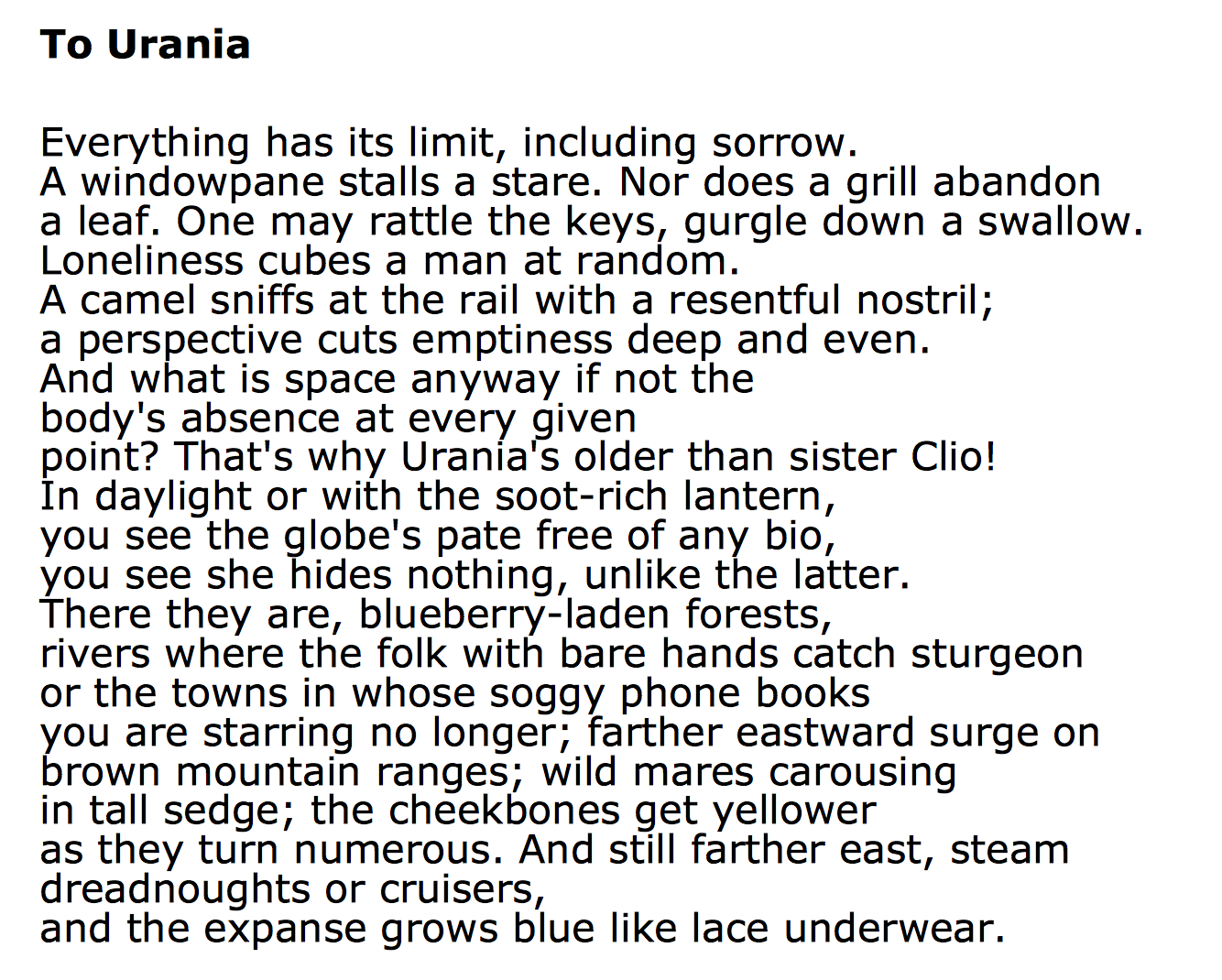
Appendix 5 “Belfast Tune”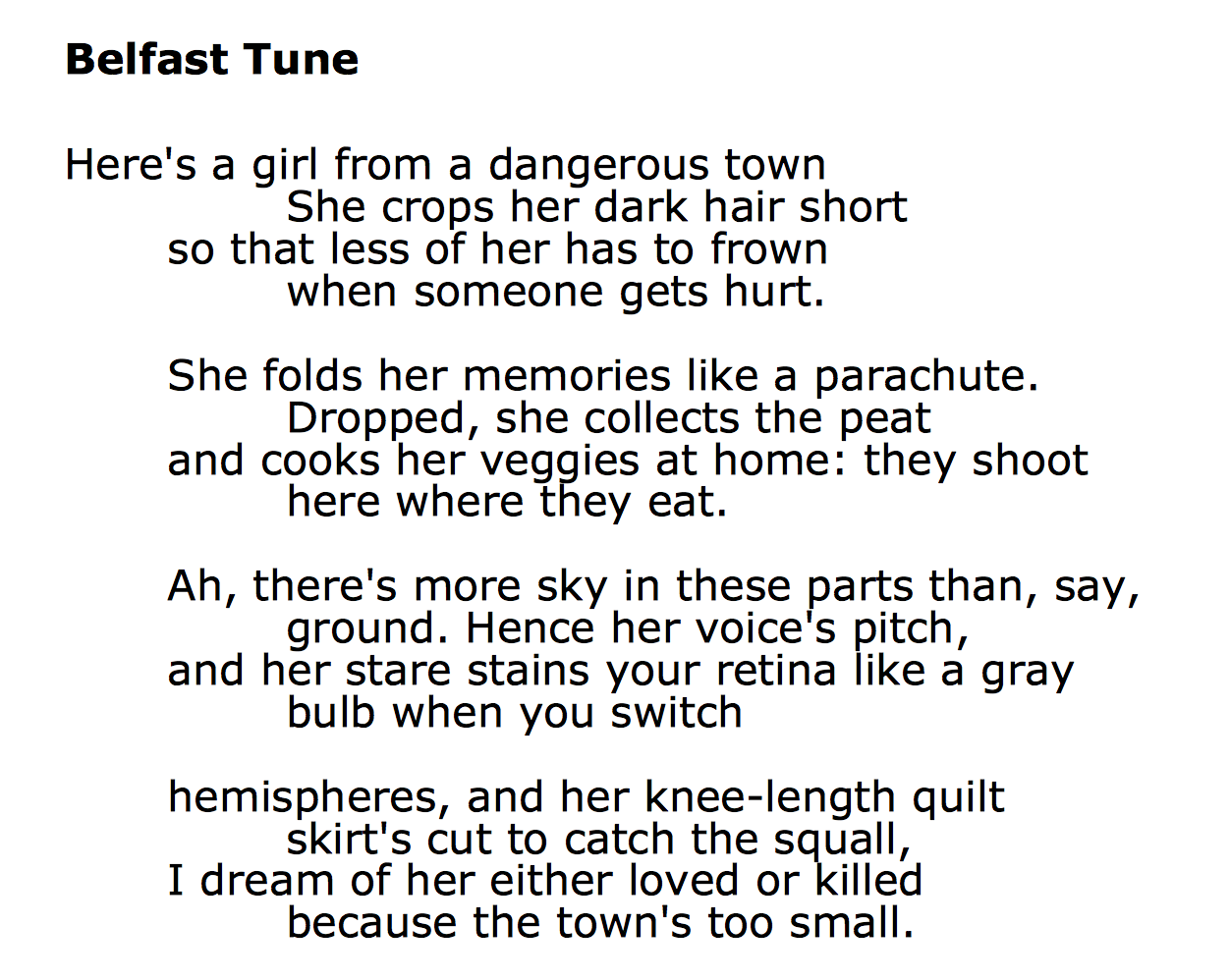
Appendix 6 “A list of some observation…”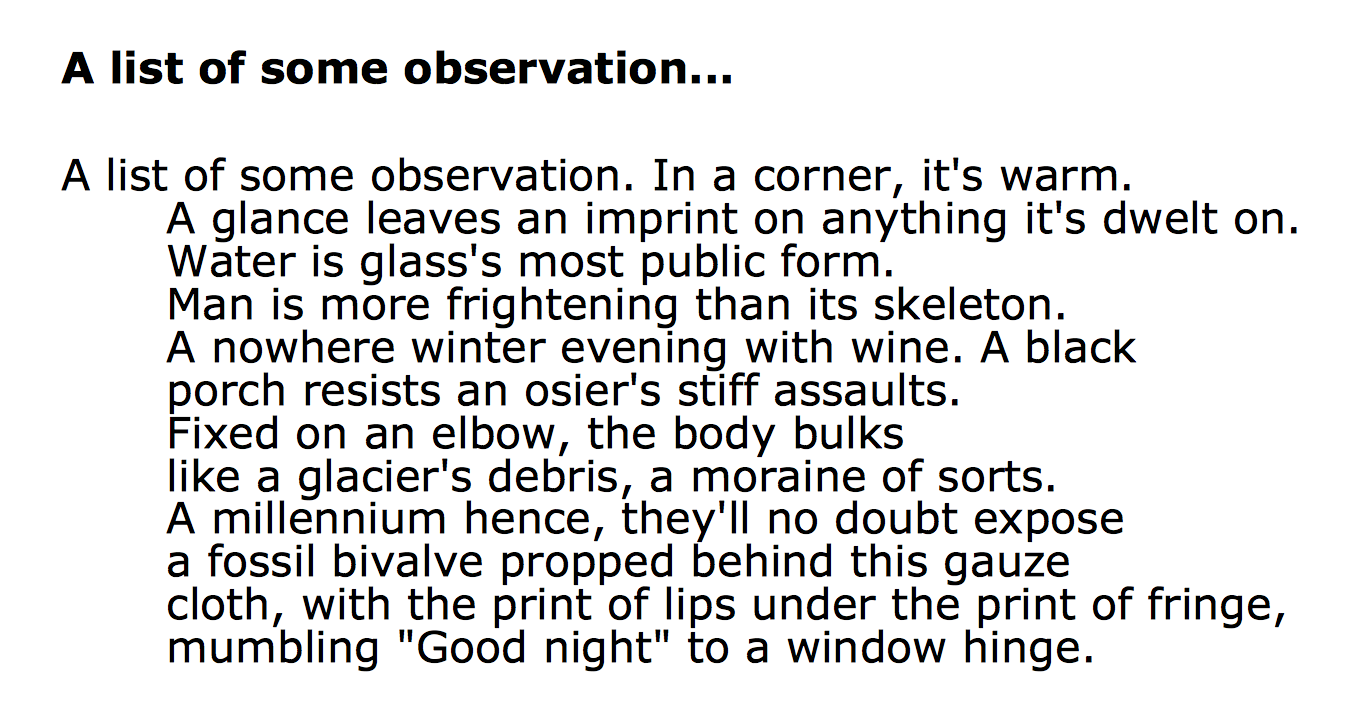
Appendix 7 “Stone Villages”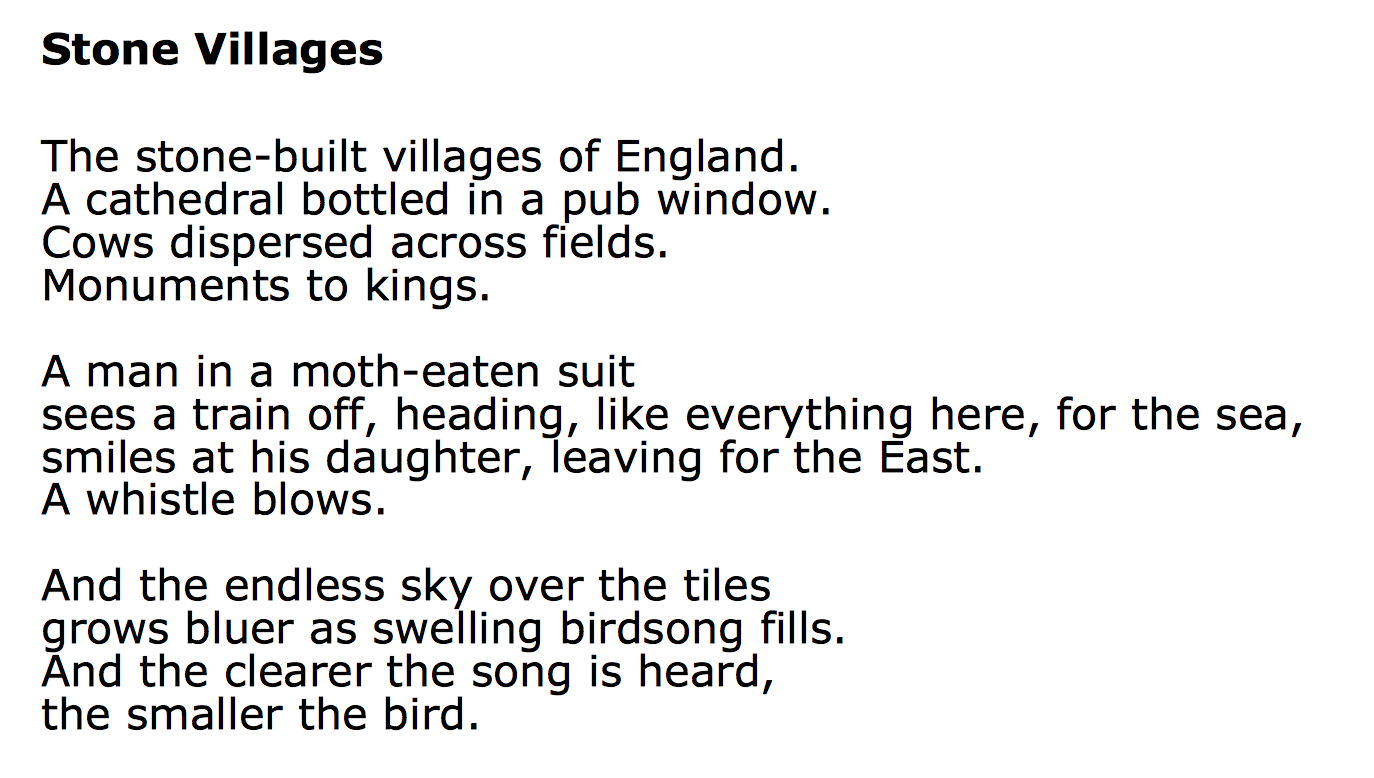
Appendix 8 “Star of Nativity”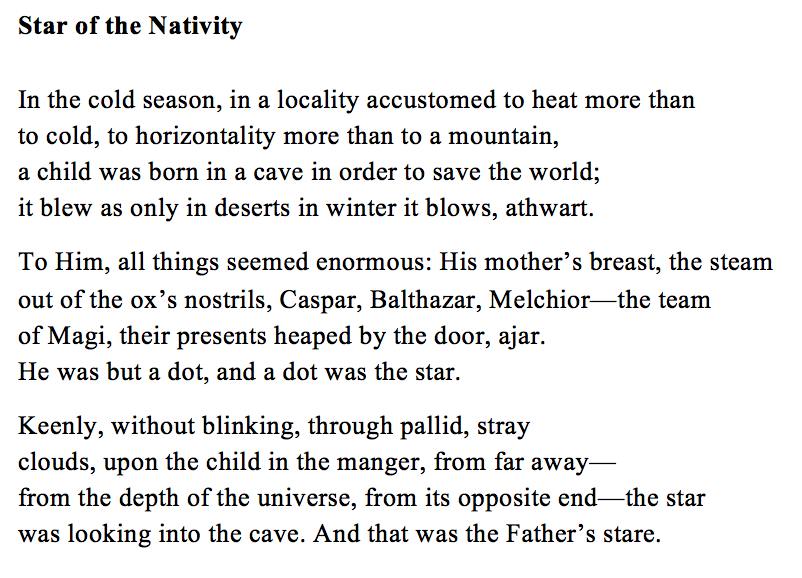
Appendix 9 “First version of my own poem”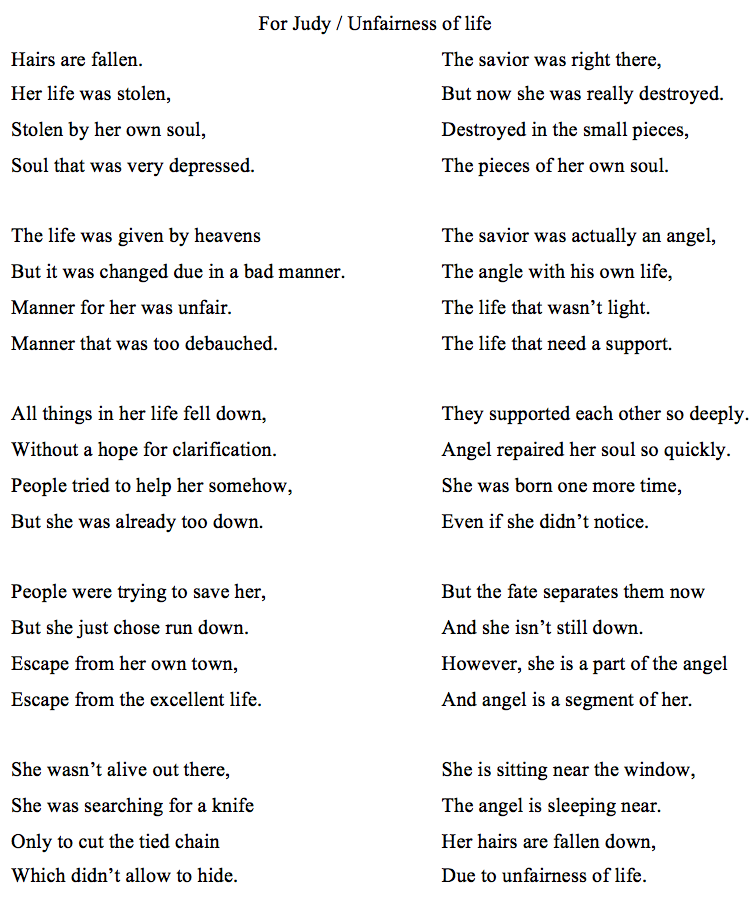
Appendix 10 “The outlook of the survey questions 1 to 4”
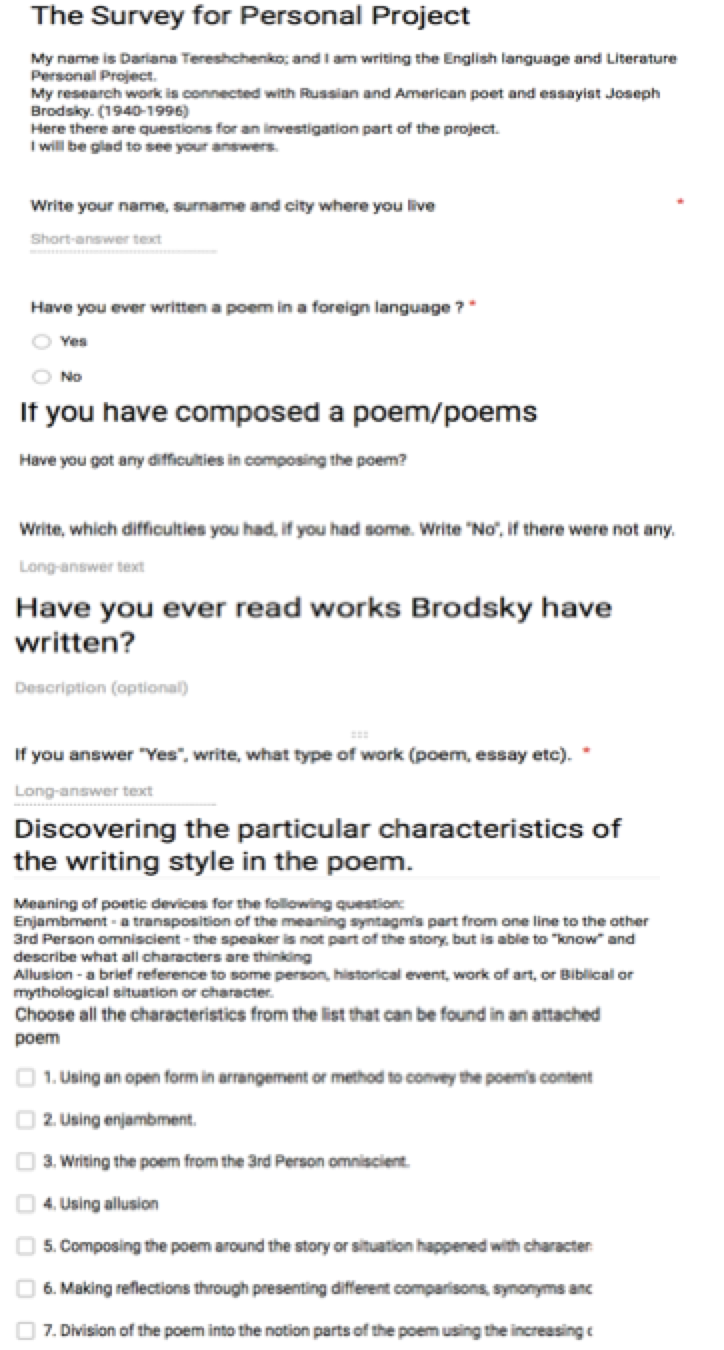
Appendix 11 “The outlook of the survey questions 5 and 6”
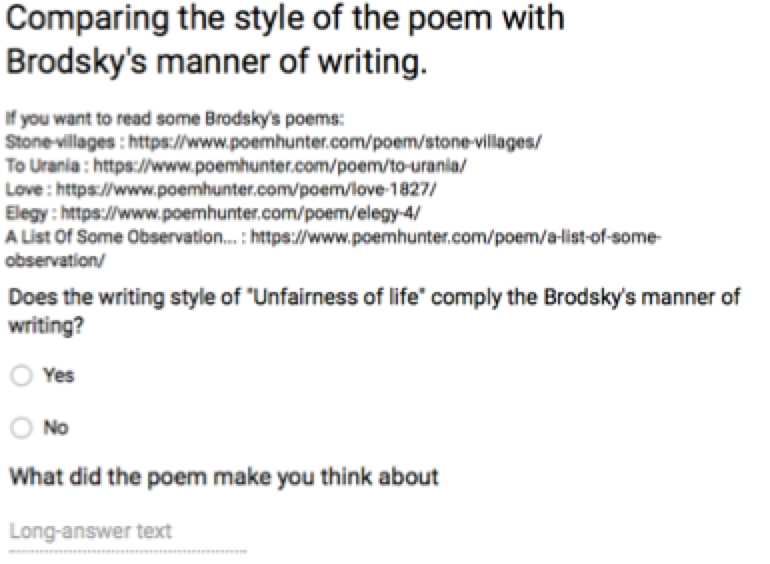
Appendix 12 “Results of the 1st question of the survey”
Appendix 13 “The chosen person’s answer on the 2nd question”

Appendix 14 “The name of chosen person in the table of survey’s results”
![]()
Appendix 15 “Some answers on the 3rd question of the survey”
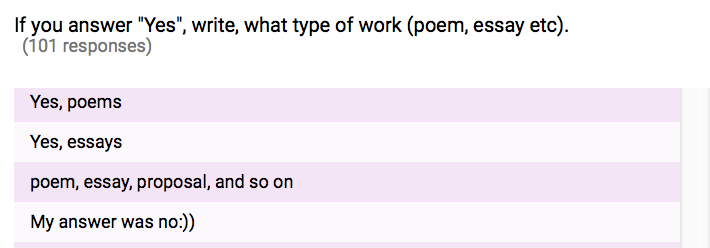
Appendix 16 “Results of the 4th question of the survey”
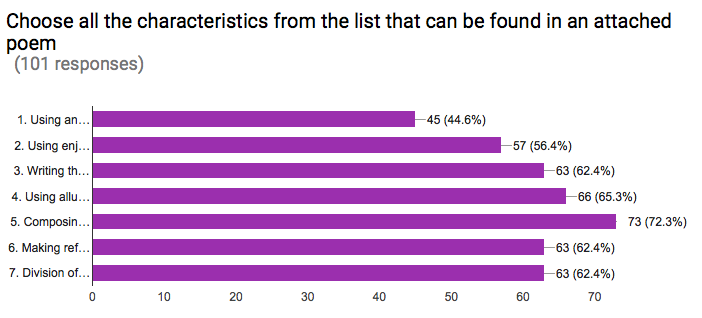
Appendix 17 “Results of the 5th question of the survey”
Appendix 18 “The chosen person’s answer on the 6th question”
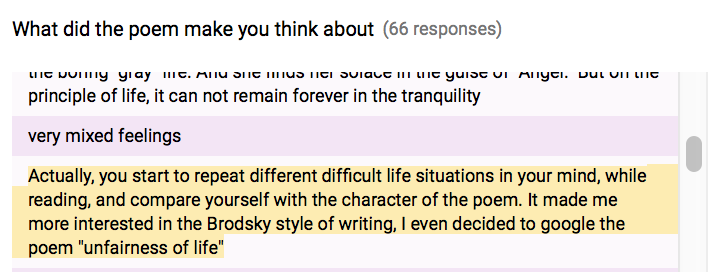
Appendix 19 “The answers of chosen people on the 6th question”

Appendix 20 “The name of the chosen people in the table of survey’s results”


